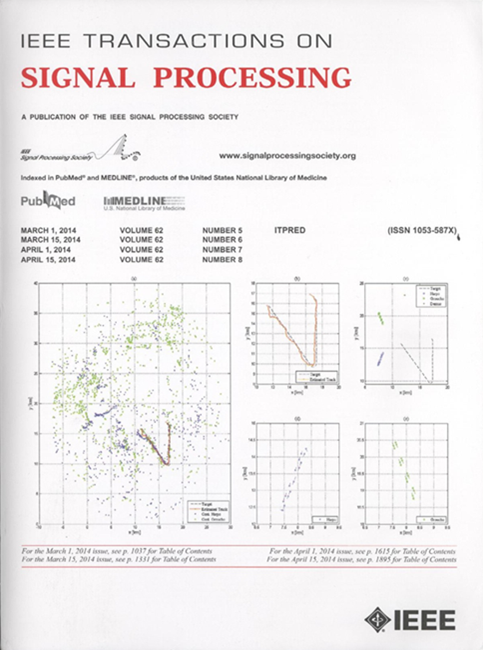传感器网络中多目标跟踪的分散变分推理框架
IF 5.8
2区 工程技术
Q1 ENGINEERING, ELECTRICAL & ELECTRONIC
引用次数: 0
摘要
本文通过提出各种分散的变分推理(VI)方案来解决多传感器多目标跟踪的挑战,这些方案与集中式传感器融合的跟踪性能相匹配,仅在相邻传感器之间进行本地消息交换。我们首先建立了一个集中式VI传感器融合方案作为基准,并分析了其分散对应方案的局限性,该方案要求传感器在每次VI迭代中等待共识。因此,我们提出了一种基于分散梯度的VI框架,该框架优化了局部最大化证据下界(LM-ELBO),而不是标准的ELBO,这减少了参数搜索空间,加快了收敛速度,使其特别有利于分散跟踪。这个提议的框架本质上是自我进化的,随着分散优化技术的进步而改进,以保证收敛和效率。此外,我们使用自然梯度和梯度跟踪策略提高了所提出的分散方案的收敛速度。结果验证了我们的分散VI方案在跟踪性能上与集中融合的经验等效。值得注意的是,分散的自然梯度VI方法是最有效的通信方法,其通信成本与次优分散策略相当,同时提供明显更高的跟踪精度。本文章由计算机程序翻译,如有差异,请以英文原文为准。
Decentralized Variational Inference Frameworks for Multi-Object Tracking on Sensor Networks
This paper tackles the challenge of multi-sensor multi-object tracking by proposing various decentralised Variational Inference (VI) schemes that match the tracking performance of centralised sensor fusion with only local message exchanges among neighboring sensors. We first establish a centralised VI sensor fusion scheme as a benchmark and analyse the limitations of its decentralised counterpart, which requires sensors to await consensus at each VI iteration. Therefore, we propose a decentralised gradient-based VI framework that optimises the Locally Maximised Evidence Lower Bound (LM-ELBO) instead of the standard ELBO, which reduces the parameter search space and enables faster convergence, making it particularly beneficial for decentralised tracking. This proposed framework is inherently self-evolving, improving with advances in decentralised optimisation techniques for convergence guarantees and efficiency. Further, we enhance the convergence speed of proposed decentralised schemes using natural gradients and gradient tracking strategies. Results verify that our decentralised VI schemes are empirically equivalent to centralised fusion in tracking performance. Notably, the decentralised natural gradient VI method is the most communication-efficient, with communication costs comparable to suboptimal decentralised strategies while delivering notably higher tracking accuracy.
求助全文
通过发布文献求助,成功后即可免费获取论文全文。
去求助
来源期刊

IEEE Transactions on Signal Processing
工程技术-工程:电子与电气
CiteScore
11.20
自引率
9.30%
发文量
310
审稿时长
3.0 months
期刊介绍:
The IEEE Transactions on Signal Processing covers novel theory, algorithms, performance analyses and applications of techniques for the processing, understanding, learning, retrieval, mining, and extraction of information from signals. The term “signal” includes, among others, audio, video, speech, image, communication, geophysical, sonar, radar, medical and musical signals. Examples of topics of interest include, but are not limited to, information processing and the theory and application of filtering, coding, transmitting, estimating, detecting, analyzing, recognizing, synthesizing, recording, and reproducing signals.
 求助内容:
求助内容: 应助结果提醒方式:
应助结果提醒方式:


